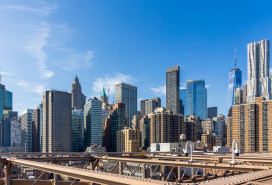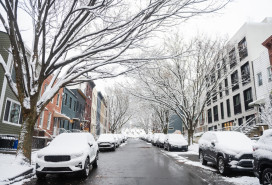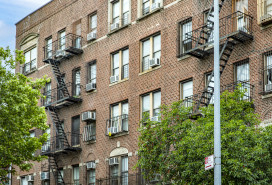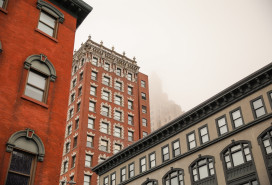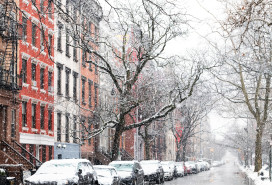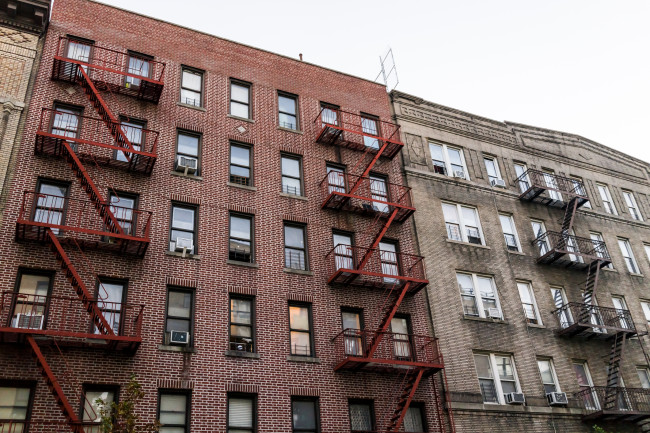Adams proposes more ‘family-sized’ apartments in State of the City address
- The mayor announced plans to build more housing for NYC families, although details were minimal
- Adams touted ‘City of Yes,’ a landmark plan to build more than 80,000 new housing units in 15 years
- The mayor alluded to his administration’s “challenges” but didn’t speak directly about his indictment

Mayor Eric Adams delivered his State of the City address on Thursday at the historic Apollo Theater in Harlem.
Photo courtesy of Michael Appleton/Mayoral Photography Office
Mayor Eric Adams announced plans to create more apartments for New York City’s families and build 100,000 new housing units in Manhattan over the next decade in his State of the City address on Thursday.
His speech also celebrated City of Yes for Housing Opportunity, a landmark plan to create more than 80,000 new housing units over 15 years through denser development. The City Council passed a modified version of the plan on Dec. 5th with $5 billion in city and state funding, plus a commitment to build housing for low-income New Yorkers.
“The housing crisis is real, and we know how to solve it, by building more homes,” Adams said in an address at the historic Apollo Theater in Harlem on Thursday.
Read on for an overview of the mayor’s new proposals to build more housing in NYC.
‘City of Yes for Families’
Adams announced plans to “create more family-friendly neighborhoods,” by building more “family-sized units” near schools, grocery stores, and libraries, he said Thursday. Details on how he would achieve that plan, however, were scant.
He gave the example of Manhattan Valley’s Bloomingdale Library, where Adams said his administration plans to build 800 new units of mixed-income housing. (The city wrapped up a similar project that constructed 174 apartments above the new Inwood Library in June.)
The city can put pressure on developers to include larger, affordable units in projects that receive funding from the NYC Department of Housing Preservation and Development, said Patrick Sullivan, a zoning lawyer at Kramer Levin. He expected HPD to create a new policy favoring these bigger apartments.
“They’re prioritizing larger units, which is something that HPD can do through its funding priorities,” Sullivan said.
“City of Yes for Families” will also include ways to help New Yorkers make a downpayment, and use on-time rental payments to improve their credit history. (FYI: you can earn credit card points for making rent payments and boost your credit score when you make on-time payments through a handful of apps.)
The nonprofit the Center for NYC neighborhoods, which helps New Yorkers navigate problems like foreclosure, celebrated the mayor’s “commitment to affordable homeownership,” said Christie Peale, the center’s CEO and executive director in a statement.
"Expanding and preserving affordable homeownership is critical to ensuring that New Yorkers can afford to stay in their communities,” Peale said.
The mayor’s plan also supports some owners who want to add an accessory dwelling unit to a property. Under the recently passed City of Yes for Housing Opportunity, New Yorkers in one- and two-family houses can build ADUs, though City of Yes restricts certain backyard ADUs and those in areas at risk of flooding.
A representative for the mayor did not respond to additional questions about his proposals.

‘100,000’ new housing units in Manhattan
In another big announcement, Adams proposed adding 100,000 new housing units in Manhattan over the next decade by building on public land. That proposal will include existing city plans to allow the construction of 9,700 new units in Midtown South, now that state has lifted restrictions on how densely developers can build housing.
The city would need to rezone more areas in Manhattan to build more apartments, Sullivan said. Rezonings—and developing city land—can create more housing, though the number of units he has promised “seems high,” Sullivan said. (In comparison, City of Yes is expected to pave the way for more than 80,000 new housing units over the next 15 years.)
“I’m not sure how they get to 100,000, but we’re encouraged that they're trying,” Sullivan said.
Kenny Burgos, CEO of the landlord group the New York Apartment Association, celebrated the announcement, calling it “another step towards the ultimate goal of abundant housing.”
Lastly, the mayor also touted how his administration “advanced” 26 affordable housing projects on publicly-owned lots across the five boroughs, mostly by securing financing, selecting development teams, or accepting proposals for new projects, according to the city. Not all of these projects have been completed.
Housing for homeless New Yorkers
Adams also announced plans to create 900 more Safe Haven beds—temporary housing for homeless New Yorkers—for those sleeping in the city’s subway system, and a proposal to build a new housing facility solely for New Yorkers with serious mental illnesses
That facility would offer homeless New Yorkers “psychiatric care and substance use treatment,” as well as help securing permanent housing, according to a city press release following the address.
Adams also called on New York State to pass legislation that would make it easier to involuntarily hospitalize New Yorkers in need of mental health care. The New York Civil Liberties Union, however, has criticized the proposal for threatening New Yorkers’ rights and not addressing the dearth of mental health resources in the city, Gothamist reported.
Adams also announced a new program to connect New Yorkers who are about to have a child with shelter services, to help them find permanent housing “before their child is born.”
“No child should ever be born in our shelter system,” he said.

Shadow of indictments, mayoral election
Adams alluded to his administration’s “challenges,” though he did not mention that he was indicted on federal criminal charges including bribery, fraud, and soliciting illegal foreign campaign donations earlier this year. (Several of his top officials have also been indicted, convicted, or resigned.)
Adams has pleaded not guilty to corruption charges, and is running for reelection this year along with more than two dozen candidates.
Adams did not mention the upcoming election during his address. But his housing announcements could help his campaign, Sullivan said.
“They need to show some movement in some new initiatives as they go into an election year,” Sullivan said.


